:bpr:
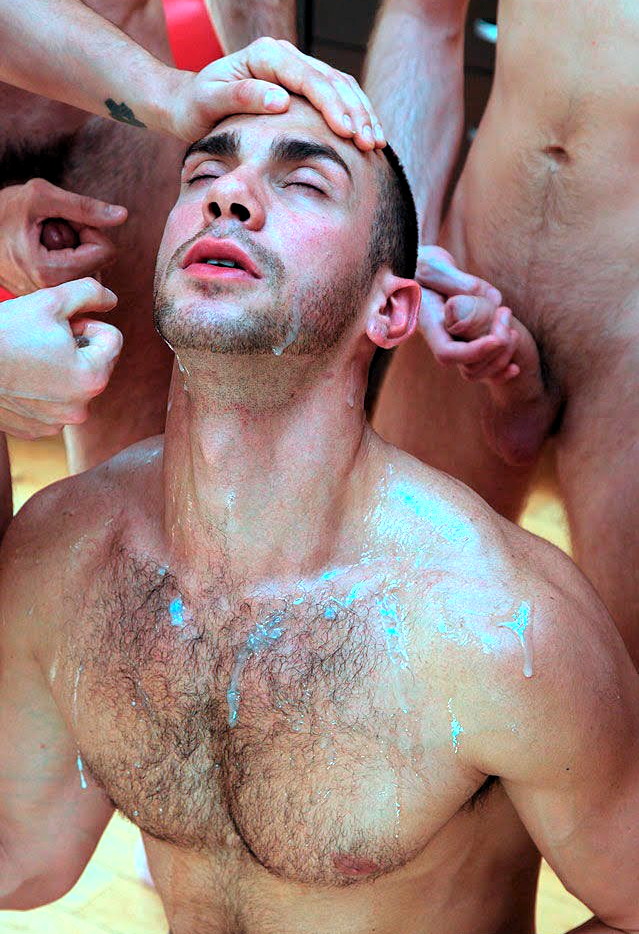





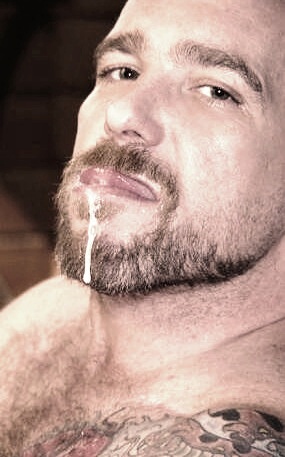
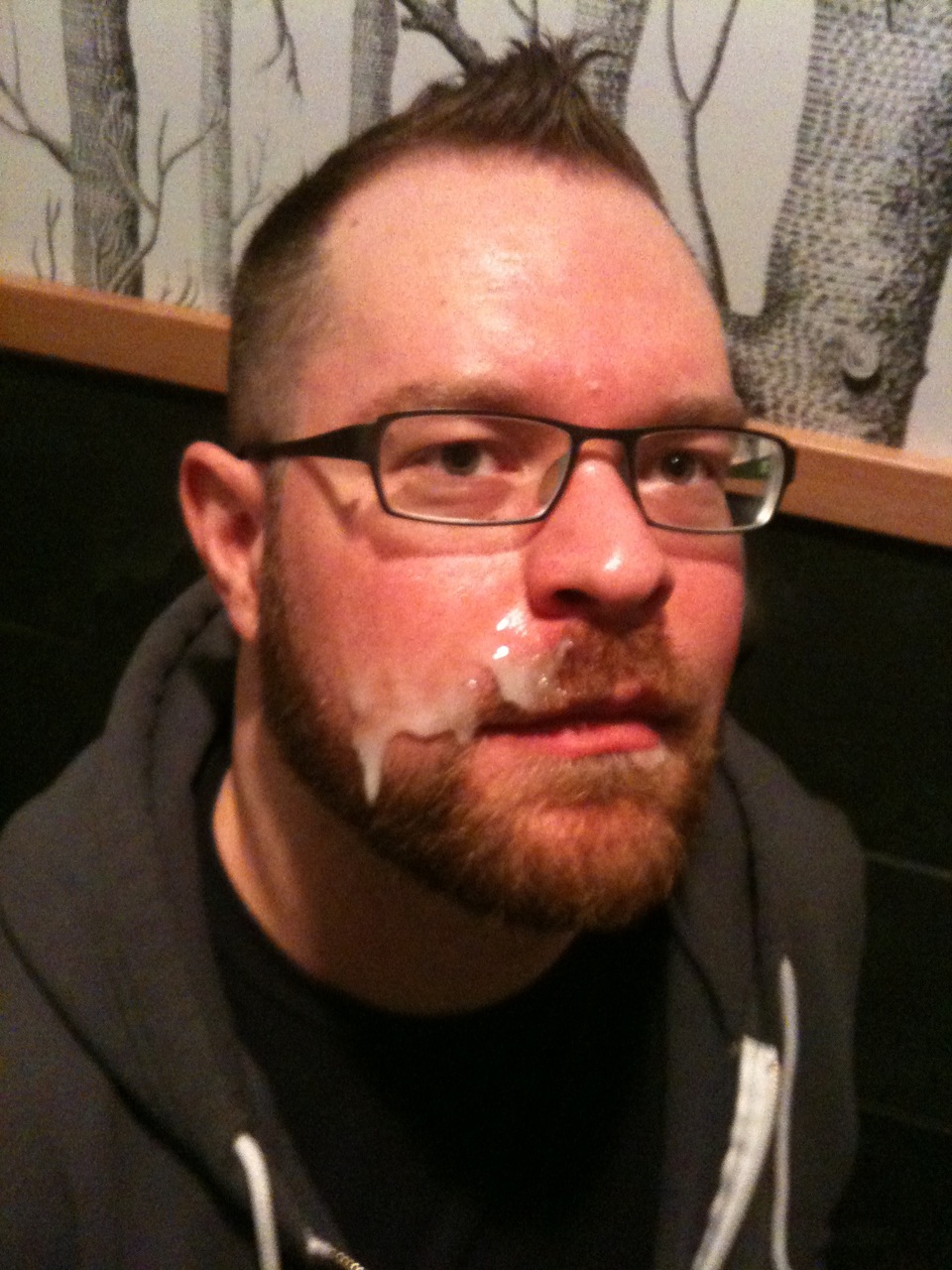
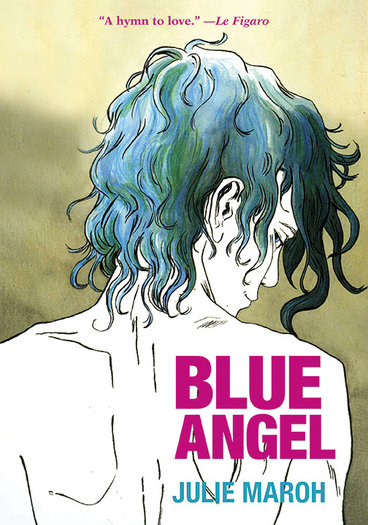
Palme d'Or winner "Blue is the Warmest Color" is based on a French graphic novel due to be released in English this year under the title "Blue Angel." (Arsenal Pulp Press)
By Jenny Hendrix
May 27, 2013, 11:51 a.m.
This post has been corrected, as indicated below.
The French drama "Blue is the Warmest Color" won the prestigious Palme d'Or at Cannes on Sunday, making it the first graphic-novel adaptation to take the top award. Another comic-based film, Marjane Satrapi's "Persepolis," tied for the Cannes Jury Prize in 2007.
The Palme d'Or winner is based on "Le Bleu Est une Couleur Chaude" ("Blue is a Hot Color"), a graphic novel by Julie Maroh that was published in 2010 in France. The book is scheduled to be released in English this fall by Arsenal Pulp Press under the title "Blue Angel."
"I have no words to describe the amplitude of what I've experienced for the past few hours, few days," Maroh wrote on her website (in French). Maroh said that she had already seen the film twice, and would offer some words on it shortly. But her message, all told, was a simple one: "Make comic books. It's cool."
The nearly three-hour film, written and directed by Abdellatif Kechiche and starring Adele Exarchopulos and Lea Seydoux, tells the story of a 15-year old girl who falls in love with a woman. Due to its reportedly explicit depictions of lesbian sex, it has drawn a fair amount of controversy.
"I'm not sure it will be allowed to play in every state," Steven Spielberg told journalists Sunday. Spielberg, in his capacity as Cannes jury president, had presented the award, heaping praise on the film and its director, calling it a "great love story."
"Blue is the Warmest Color" has reportedly been acquired for U.S. distribution, though the date of its release here has not yet been announced.
[For the record, 9:52 p.m., May 27: An earlier version of this post misspelled Maroh's name and has been corrected.]

The former Oklahoma standout says his Christian perspective on homosexuality would not affect his treatment of a gay teammate
By Cyd Zeigler
When I approached Pittsburgh Steelers rookie quarterback Landry Jones for my short interview at the NFLPA Rookie Premiere last week, I noticed two things. First, the guy is approachable. Some athletes have this "don't even THINK about asking me a question that isn't about football or video games" vibe. That's not Jones. He's cool, calm and an open book.
The second thing I noticed was a sentence scribbled on his hand. As my cohort for the day, SB Nation NFL editor Ryan Van Bibber, asked questions about Jones' new home in Pittsburgh and backing up Ben Roethlisberger, I stole glances at the words. I only made out "Philippians" and a couple numbers: He had written a passage from the New Testament on his hand.
The former Oklahoma quarterback is deeply religious. His twitter profile features his handle - LandryJones12 - and this short mission statement: "In everything you do, work as if you are working for the Lord." He recorded a five-minute PSA for the I Am Second campaign, aimed at inspiring people to live for Jesus Christ. And yeah, for his NFLPA Rookie Premiere interviews, he wrote a Bible passage on his hand.
After introducing myself and the topic I wanted to discuss with him, I asked Jones about the perception that Christians and gays cannot get along, and whether that dynamic creates a conflict for the two communities.
"There's not a conflict," Jones said. "People are people and God tells us to love everybody. And so that's what I do."
When he said the words, they felt like a canned line strung together by a handler who'd gotten hold of him to "say the right thing." But as he talked more, it became clear that this young man was opening his heart and mind to me on an issue he felt surprisingly comfortable talking about.
"Now, do I condone what they're doing? No, I don't think it's right," he continued. I could feel the NFLPA folks over my shoulder thinking about the mandatory media firestorm that would envelope Jones once his comments got out.
Except, he took a turn I wasn't expecting.
"But, am I going to go out there and not talk to them? Am I going to go out there and be hateful and mean to them? I think that's ignorant. I think we respect and love everybody. But, there's also a moral standard there for me, and I'm going to take a stand on that. I don't think it's right, but it's their life and I'm not going to go up because someone is gay and be mean or hateful and say terrible things to them. I'm going to treat them like a human being."
Some, of course, will latch onto the first part of Jones' statement about not thinking homosexuality is "right," tar and feather him, and cast him into the lot of the homophobes.
Yet fair-minded people will see the important nuance of what he said: We may not see eye-to-eye on this issue, but that's not going to affect how he treats me. There was no mention of hell. No mention of sin. No comparison to drug use or robbing a bank. Instead, there was a level of respect in his words.
What stood out to me was his use of the word "ignorant." He didn't call gay people or anti-gay people "ignorant." Instead, he directed that label at those who would treat gay people differently from anyone else; I imagine he would use the same word to describe anyone who would treat a Christian differently.
When I shared Jones' comments with former NFL defensive end Esera Tuaolo, himself a devout Pentecostal Christian, he was elated. Finally, he said, another Christian was speaking his language.
"What he's saying is what a Christian should be all about," Tuaolo said. "Every time you hear something from a Christian fundamentalist, it's always negative. And it's amazing to have this young gentleman be so articulate and so smart and say it in a way that I feel like I'm not being judged or hated. I can hear the compassion. He believes what he believes yet he understands we are all children of God. I'm going to pray for him."
I pressed on with Jones, next asking him how his thoughts about homosexuality would play out if he had a gay teammate.
"It doesn't matter if you're gay or if you're straight," Jones said. "If you can play the game of football, you're going to be on a team and you're going to have a job. Just like if you're in a regular business setting. If you can do your job well, you can do your job. You can get paid and earn a living and provide for your family, whatever your family looks like."
That last line stuck in my mind: "Whatever your family looks like." There was something powerful in that. He didn't have to say it, but he did. While he may not personally believe that my relationship with my partner of 10 years is on the up-and-up, that last line was an acknowledgement that his beliefs are irrelevant for my personal life, and I have the right to the family that works for me.
Jones' comments also work for You Can Play co-founder Patrick Burke, who welcomed the rookie quarterback's perspective.
"Is our fight trying to establish what happens to us after we die?" Burke asked, referring to traditional Christian doctrine that says homosexuality leads to hell in the afterlife. "Or is our fight trying to establish what happens to us while we play sports? If your fight is against people who think homosexual sex is immoral, then your fight is against Christianity. Our fight is, 'Hey, we just want people to play football and not be harassed.'"
The beauty of sports is that people of all walks of life must come together to achieve a single common goal. Some are Christian who must accept a gay teammate, and some are gay who must accept a Christian teammate.
"We shouldn't mind people having their own opinion," said Tuaolo, who is You Can Play's special adviser on faith and religion. "That's part of being human and having our own free will, to believe what we want."
When the interview with Jones was finished, the Steelers rookie stuck out his hand, shook mine, and thanked me for my time. He left me with only one request: That I use his comments unedited and in full, as I've done above.
Gay former NFL player Wade Davis, who co-founded the YOU Belong Initiative to encourage LGBT inclusion in youth sports, thought Jones' comments were a welcome revelation.
"Even though he may have some religious beliefs that make him believe the act of homosexuality is wrong, he still understands the ideas of love and respect and acceptance," Davis said. "I also love he didn't talk about tolerance. He was speaking more like, 'hey, I'm going to treat this person with love.' He wasn't saying we're bad people, he was just saying it wasn't for him."
If we're going to open sports for everyone, Jones' willingness to put his personal feelings aside and treat people equally is the kind of perspective we must be willing to hear. Just as we want men like Jones to accept us, we must accept them.
As a lifelong Patriots fan, my only regret now is that one of my new favorite NFL players is a Steeler.
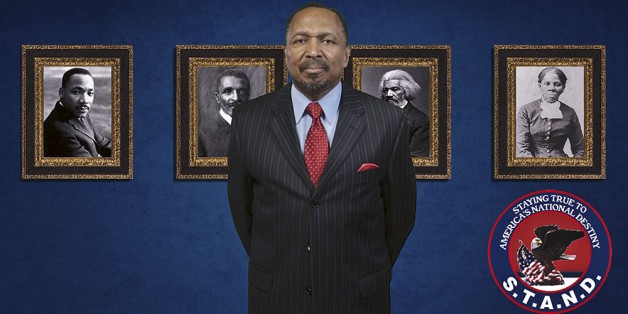
E.W. Jackson ~ A candidate for lieutenant governor in Virginia who might have done well a decade ago now faces an increasingly tolerant electorate.
By Alex Roarty
For a moment last week, Ari Fleischer found a subject more worthy of derision than Benghazi or the Internal Revenue Service. President George W. Bush’s former press secretary took aim at a fellow Republican named E.W. Jackson.
A day earlier, Jackson had improbably won the GOP’s lieutenant-governor nomination in Virginia, taking advantage of a party convention controlled by conservative activists who didn’t mind the Chesapeake-area minister’s relative anonymity. (Only a year ago, Jackson won less than 5 percent of the vote in a GOP Senate primary.) They also didn’t seem to know, or care, that Jackson had a long history of antigay rhetoric, the most incendiary of which includes saying that gay men and women are “very sick people psychologically, mentally, and emotionally,” calling them “perverted,” and comparing homosexuality to pedophilia.
That’s what drew Fleischer’s ire. “Jackson’s antigay slurs are indefensible,” he tweeted.
That a prominent Republican—one whose president only nine years earlier had successfully used gay rights as a wedge issue during his reelection campaign—would offer such a blunt, caveat-free condemnation is a testament to how gay politics has changed in a decade. And Fleischer’s comment is indicative of the fact that Jackson’s week-old campaign is already under siege, so much so that some operatives are speculating he might yet drop out of the race.
All of which suggests that gay politics is nearing a critical threshold: Candidates with a known bias against homosexuals might now face close to the same impenetrable barrier to office as politicians biased against blacks, Jews, or women. Candidates known to be racist, anti-Semitic, or misogynistic are all effectively barred from winning elections in the 21st century—and homophobes might be joining that list. “Even those people who are, based on their faith, against homosexuality, they do not want someone who is going to legislate based on hate toward any group,” said Mo Elleithee, a Democratic consultant and a veteran of Virginia politics. “It is disqualifying. Nothing else he says is ever going to be heard.”
The campaign for lieutenant governor is a good test case in a purple state, but it’s not perfect. Jackson, who is black, also compared Planned Parenthood to the Ku Klux Klan and suggested that President Obama holds a Muslim worldview—meaning that he’ll not only be labeled antigay, he’ll also be labeled as an extremist. Some Republicans continue to believe that although he faces a daunting challenge, Jackson could still win. And Republicans and Democrats agree that even if Jackson, whose invective personally maligns the gay community, loses in November, opposition to gay marriage will still remain politically viable.
But few doubt that antigay slurs carry far more consequence than they did just several elections ago. A Gallup Poll released last week found that 59 percent of Americans consider gay relations morally acceptable—a 19-point shift toward that viewpoint from a survey in 2001. Of the 20 moral issues Gallup polled over the 12-year span, no other issue had such a large swing in its favor. “If he had said this six or eight years ago, I don’t know if we’d be having this conversation, quite frankly,” said one Republican strategist in Virginia, who requested anonymity to speak candidly. “I do think it’s moved forward to a point where this has potential to be a real disqualifier as a candidate.”
To some analysts, the shift is about more than how the public views gay men and lesbians. There’s a larger ongoing evolution, they say, in which voters are far less tolerant of intolerance, period. The victim of the intolerance, whether it be a religious, sexual, or ethnic minority, is almost unimportant. “When you espouse that kind of hatred to any human being, regardless of what they are, or who they are, you are going to have a difficult time putting together the necessary coalitions to get 51 percent of the vote in the 21st century,” said another Virginia GOP strategist. The source added, “White women are not going to go for that. There is a large group of white men who won’t go for that. There are a lot of Republicans who don’t go for that. This is a question about humanity.”
The stern shift against antigay rhetoric would seem to put many religious politicians in a bind. Jackson’s views stem from his faith; the graduate of Harvard Divinity School founded his own church, Exodus Faith Ministries. And many Republicans continue to say their faith dictates that homosexuality is a sin.
But that doesn’t mean, they quickly add, that the kind of rhetoric Jackson has used is acceptable. Republicans need to stick to their principles, they say, while not personally denigrating any group of people. “If you’re a candidate, you want to treat all people with respect,” said Bob Vander Plaats, a prominent social conservative in Iowa who has drawn flak for his own comments that critics consider antigay. “You want to communicate what you’re for, not so much what you’re against.”
In an off-year election that could hinge on base turnout, Republicans point out that Jackson might prevail. If he does, antigay politics may not yet be a disqualifier. But if he loses, don’t be surprised if conservative activists do a little more homework before picking their candidates in the future.
This article appears in the May 25, 2013, edition of National Journal as The Risks of Bias.
Get the latest news and analysis delivered to your inbox. Sign up for National Journal's morning alert, Wake-Up Call, and afternoon newsletter, The Edge.
Kennedy viewed as crucial justice by both sides
By Mark Sherman
WASHINGTON — Three US states and three countries have approved same-sex unions just in the two months since the Supreme Court heard arguments on gay marriage, raising questions about how the developments might affect the justices’ consideration of the issue.
In particular, close observers on both sides of the gay marriage divide are wondering whether Justice Anthony Kennedy’s view could be decisive since he often has been the swing vote on the high court.
“It is always possible that Justice Kennedy is reading the newspapers and is impressed with the progress,’’ said Michael Klarman, a Harvard University law professor and author of a recent book on the gay marriage fight.
In earlier cases on gay rights and the death penalty, Kennedy has cited the importance of changing practices, both nationally and around the world.
The court is expected to rule by late June in two cases involving same-sex marriage.
One is a challenge to California’s voter-approved Proposition 8 that defines marriage as the union of a man and a woman. The other seeks to strike down a portion of the federal Defense of Marriage Act that denies to legally married same-sex couples a range of benefits generally available to married heterosexuals.
The justices took an initial vote in the days after hearing arguments in the two cases in late March. The senior justice on the winning side and the senior justice in dissent assigned opinions based on those votes. But while that first vote is important, it is not the end of the process; justices’ assessments of a case can shift subtly or, in some cases, dramatically.
In 1992, Kennedy initially drew the assignment to write a majority opinion for five justices allowing prayers at public school graduations. In the end, he ended up writing the opinion for a different five-justice majority striking down the graduation prayers. According to several accounts, Kennedy simply changed his mind during the writing process.
Current events also can find their way into opinions. Last year, Justice Antonin Scalia’s fiery dissent from a court ruling that watered down Arizona’s crackdown on immigration included a reference to comments President Obama made at a news conference that took place between the argument in the case in April and the announcement of the decision in June.
There is no way to know at this point whether anything similar will occur in the gay marriage cases, either of which could be decided on technical legal grounds that would say little about the court’s view of the issue. But there has been no shortage of action.
In a 10-day span this month, Delaware, Minnesota, and Rhode Island gave final approval to bills to legalize same-sex marriages. Minnesota became the 12th state, as well as the District of Columbia, to approve same-sex unions. The other nine are: Connecticut, Iowa, Maine, Maryland, Massachusetts, New Hampshire, New York, Vermont, and Washington.
And more change could come soon. The Illinois Senate has approved a gay marriage bill that now is pending in the state House in advance of the May 31 end of the legislative session. Governor Pat Quinn has said he would sign it.
Both sides in the high court gay marriage debate say the recent events reinforce arguments they made to the court in March.
Defenders of limiting marriage to heterosexuals say the justices need only look at the change in marriage laws to see that there is no reason for them to declare a national rule for gay marriage that would upend constitutional bans in 30 states and laws prohibiting same-sex unions in roughly half a dozen others.
‘‘These developments provide yet further evidence . . . that the claim that gays and lesbians are politically powerless and that the courts therefore have some special role in subjecting classifications affecting them to strict scrutiny is baseless,’’ said Ed Whelan, an opponent of same-sex marriage and president of the Ethics and Public Policy Center.
Jim Campbell, a lawyer for Alliance Defending Freedom, said the court should not short-circuit a national debate.
‘‘The vast majority of the states have decided to retain the traditional view of marriage that has existed throughout Western civilization. This decision belongs to the people and should be decided by the people,’’ Campbell said.
Mary Bonauto, the director of the Civil Rights Project at Gay and Lesbian Advocates and Defenders, said the assessment of the political clout of gays and lesbians is misleading. The number of states allowing same-sex weddings has doubled in less than a year and now represents 18 percent of the US population. If Illinois joins in and the court were to affirm a lower court decision that struck down the California ban, just over a third of the population would live in 14 states and the District of Columbia where gay marriage would be legal.
That is not nearly enough, especially in the context of a decades-long struggle by gays and lesbians to win the right to marry, Bonauto said. ‘‘These states moving in the direction of marriage is a far cry from all states doing it,’’ she said.

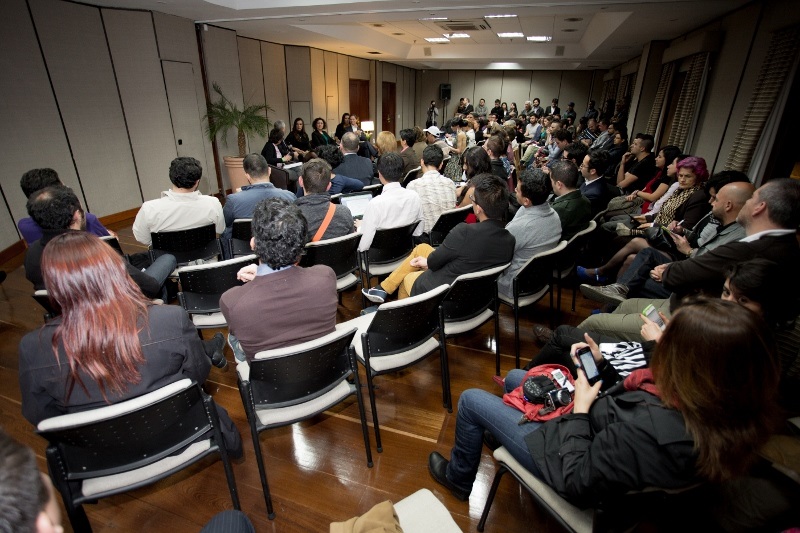
Gay Politics 5/31/2013
More than 150 participated in a panel discussion Thursday night in Bogotá, Colombia, about the participation of LGBT individuals in government as elected and appointed officials. The event was part of a four-day program made possible by a public-private partnership of the U.S. Agency for International Development.
Participants included Gay & Lesbian Victory Institute President Chuck Wolfe; lesbian Bogotá City Councilwoman Angélica Lozano; Tatiana Piñeros, a transgender woman whom Bogotá Mayor Gustavo Petro last year appointed to run the city’s social welfare agency and Francisco Herrero, director of the Democratic National Institute, which encourages underrepresented groups to become involved in the South American country’s political process. Marcela Sánchez, executive director of Colombia Diversa, a nationwide LGBT advocacy organization, moderated the panel, according to a report in the Washington Blade:
Wolfe said the most basic reason he feels it is important for LGBT people to become involved in the political process is because there are some people “who think that being gay, lesbian, bisexual or transgender is something wrong.”
“The basic premise of serving in public office means you represent people,” he said. “They see you as a fellow person who represents you and other elected or appointed officials also have to work with you and they begin to say there’s nothing wrong with being gay or lesbian or bisexual or transgender.”
Wolfe said the most basic reason he feels it is important for LGBT people to become involved in the political process is because there are some people “who think that being gay, lesbian, bisexual or transgender is something wrong.”
“The basic premise of serving in public office means you represent people,” he said. “They see you as a fellow person who represents you and other elected or appointed officials also have to work with you and they begin to say there’s nothing wrong with being gay or lesbian or bisexual or transgender.”
…
The panel took place at the start of a four-day USAID-sponsored training the Gay and Lesbian Victory Institute and the Astraea Lesbian Foundation for Justice will conduct with Colombia Diversa that is designed to teach participants how to become involved in the South American country’s political process.
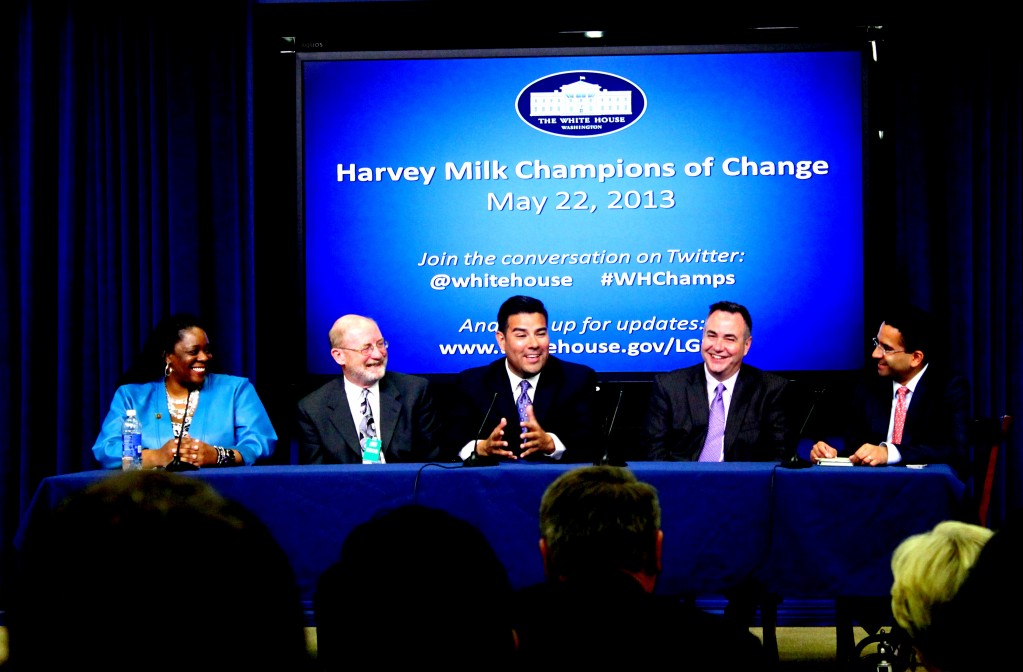
Pictured: Georgia state Rep. Simone Bell; Calif. Sec. of Natural Resources John Laird; Calif. state Sen. Ricardo Lara; Colo. state Sen. Pat Steadman; Gautum Raghavan of the White House Office of Public Engagement.
May 22, 2013 / Gay Politics
White House officials including Valerie Jarrett, a top adviser to President Obama, today spoke at an event honoring “Harvey Milk Champions of Change,” a group of 10 openly LGBT elected and appointed officials who were nominated for the honor by the American public.
Deputy Assistant to the President David Agnew opened the event by introducing the out officials to a crowd of more than 100 at the Eisenhower Executive Office Building.
Stuart Milk, the nephew of the late civil rights hero Harvey Milk, gave a keynote speech in which he congratulated the honorees and spoke about his uncle’s dream that LGBT people would one day serve in elected office everywhere.
“The last time I was at the White House to receive the Presidential Medal of Freedom in my uncle’s honor, the president leaned in and asked me, ‘Do you think Harvey would have ever seen this coming?’ And I said, ‘Yes, sir. He always believed we would get here,’” Milk said.
The two-hour celebration of the contributions of LGBT officials included two panels moderated by White House staffers Gautam Raghavan and Kellyn Blossom.
The 2013 Harvey Milk Champions of Change are:
Simone Bell – Georgia State Representative, Atlanta, GA
Angie Buhl O’Donnell – South Dakota State Senator, Sioux Falls, SD
Karen Clark – Minnesota State Representative, South Minneapolis, MN
Michael A. Gin – Mayor of Redondo Beach, Redondo Beach, CA
Kim Coco Iwamoto – Hawaii State Civil Rights Commissioner, Honolulu, HI
John Laird – California Secretary of Natural Resources, Santa Cruz, CA
Ricardo Lara – California State Senator, Long Beach, CA
Kim Painter – Johnson Country Recorder, Iowa City, IA
Chris Seelbach – Cincinnati City Council Member, Cincinnati, OH
Pat Steadman – Colorado State Senator, Denver, CO
Setting prison sentences of up to 14 years
The Washington Post
ABUJA, Nigeria — Nigeria’s House of Representatives voted Thursday to ban gay marriage and outlaw any groups actively supporting gay rights, endorsing a measure that also calls for 10-year prison sentences for any “public show” of affection by a same-sex couple.
Representatives appeared to unanimously approve the proposal in a voice vote, sending it immediately to President Goodluck Jonathan for him to potentially sign into law in Africa’s most populous nation. It wasn’t immediately clear if Jonathan would sign the measure, though gays and lesbians already face public ridicule and possible prison sentences in Nigeria.
While Western diplomats declined to immediately comment, the United Kingdom already has threatened to stop aid to nations that discriminate against gays. But those threats appear unlikely to assuage the desire of Nigerian authorities to further criminalize homosexuality, part of a wave of such laws in African nations eager to legislate against what they believe is a challenge of their traditional values by the West.
Nigeria’s Senate previously passed the bill in November 2011 and the measure quietly disappeared for some time before coming up in Thursday’s session of the House. A copy of the House bill, obtained by The Associated Press, mirrored what the Senate previously passed.
Under the proposed law, Nigeria would ban any same-sex marriage from being conducted in either a church or a mosque. Gay or lesbian couples who marry could face up to 14 years each in prison. Witnesses or anyone who helps couples marry could be sentenced to 10 years behind bars. Anyone taking part in a group advocating for gay rights or anyone caught in a “public show” of affection also would face 10 years in prison if convicted by a criminal court.
In its voice vote, the House simply adopted all the clauses previously passed by the Senate without any discussion. The bill now sits before Jonathan for his approval or veto. Presidential spokesman Reuben Abati did not respond to a request for comment Thursday night regarding the president’s position on the measure.
Chidi Odinkalu, the chairman of Nigeria’s National Human Rights Commission, said he only learned about the House’s vote late Thursday night. He said the bill, if passed into law, likely would be challenged in court.
“If that’s the scope, there will be serious issues,” Odinkalu said.
Gay sex has been banned in Nigeria, a nation of more than 160 million people, since colonial rule by the British. Gays face open discrimination and abuse in a country divided by Christians and Muslims who almost uniformly oppose homosexuality.
Across the African continent, many countries already have made homosexuality punishable by jail sentences. Ugandan legislators introduced a bill that would impose the death penalty for some gays and lesbians, though it was amended in November to remove the threat of execution. Even in South Africa, the one country where gays can marry, lesbians have been brutally attacked and murdered in so-called “corrective rapes.”
Nigeria’s proposed law has drawn the interest of European Union countries, some of which already offer Nigeria’s sexual minorities asylum based on gender identity. The British government recently threatened to cut aid to African countries that violate the rights of gay and lesbian citizens. However, British aid remains quite small in oil-rich Nigeria, one of the top crude suppliers to the U.S.
Hooman Nouruzi, a spokesman for the British High Commission in Nigeria’s capital, Abuja, said diplomats were examining the measure and declined to immediately comment.
In 2011, U.S. President Barack Obama issued a similar directive asking officials to “ensure that U.S. diplomacy and foreign assistance promote and protect the human rights of” gays, lesbians and the transgendered. That included having diplomats “combat the criminalization” of being gay by foreign governments.
Melissa Ford, a spokeswoman for the U.S. Embassy in Abuja, did not respond to a request for comment.
Beyond that, the proposed law could have an immediate direct effect on some groups sponsored by USAID, an arm of the U.S. government. Some funding it gives to groups to combat HIV and AIDS in Nigeria includes work with gays and lesbians — something that likely would be criminalized under the proposed law.
Nigeria has one of the world’s largest populations of people living with HIV and AIDS.
Your torrent is now visible to all members and you have 8 leechers at this time :cheers:
Jan Diehm and Katy Hall
As the U.S. Supreme Court prepares to rule on the Defense of Marriage Act and Proposition 8, all eyes are on Justice Anthony Kennedy, the likely swing vote in the gay marriage cases.
Kennedy described the issue of gay marriage as "uncharted waters" when the court first heard arguments in March. He expressed support for gay rights as he has in the past but questioned the timing of a decision because "we have five years of information to weigh against 2,000 years of history or more." He also acknowledged that Proposition 8 causes the children of gay parents "immediate legal injury."
Three states and three countries have legalized gay marriage since March with more legislation pending, and the shift towards equality could influence the Justice who has previously cited world opinion and national consensus as reason to abolish the death penalty for juveniles.
"It is always possible that Justice Kennedy is reading the newspapers and is impressed with the progress," Michael Klarman, a Harvard University law professor, told the AP.
(INFOGRAPHIC) : hXXp://www.huffingtonpost.com/2013/05/30/gay-marriage-supreme-court-_n_3348922.html
American Family Association: Gay-Accepting Straights Inviting 'Devastation Wrought by God's Wrath'
In last month’s American Family Association magazine, Ed Vitagliano lamented that gay people might not want to be friends with Christians who are opposed to marriage equality. Vitagliano is probably not boosting his chances of making gay friends with his article in June’s AFA Journal, a two-page spread with “Sodom” plastered across the top.
The thrust of the article is that “embracing homosexuality is a sign of deep spiritual sickness” in a culture. America, he writes, is on the verge of suppressing the truth about God’s plan and the duality of gender. “A downward death spiral results from such suppression,” he warns.
The homosexual movement has had such great success because Americans have become arrogantly self-indulgent and idolatrous. Straight America has embraced homosexuality because straight Americans first embraced the sexual revolution for the satisfaction of their own perverse sexual appetites.
Judgment came to Sodom because violent homosexuality was the proverbial straw that broke the camel’s back. As a prevalent sin, however, it was the manifestation of an underlying wickedness that permeated the entire culture – a wickedness that was not limited to the homosexual.
Thus homosexuality often becomes the barometer of a culture rotting out from the inside. If the problem were only homosexuality, then the simple act of pushing it back into the closet (if that were possible) would be enough to forestall judgment.
But what Ezekiel 16 teaches us is this: By the time a culture accepts idolatry, abortion and homosexuality, it is already ripe for the devastation wrought by God’s wrath.
Whether they live in a decidedly pagan culture or one, like America, that is an admixture, Christians are called to be salt and light.
Standing against the unrighteousness permeating our society might not be the easy thing to do, but it’s a whole lot easier than running from the fire and brimstone that inevitably follow.

EDMOND, OK—Following weeks of deliberation during which he carefully considered what sort of life he wanted for himself, 4-month-old baby Nathan Reynolds announced Wednesday that he had decided to be homosexual.
“I thought about it for a long time,” said Reynolds, who took into account both how his peers would view him and how he would be treated by society at large before determining his sexual orientation. “I weighed the pros and cons of homosexuality, and ultimately I decided that it was the right thing for me.”
The 16-week-old infant, who admitted that he was fully aware of the negative consequences associated with choosing to be attracted to members of the same sex, claimed that he was now prepared to go through life struggling with rejection, intolerance, and unprovoked hostility.
In addition, Reynolds confirmed that he opted for homosexuality despite very serious concerns about sustaining permanent psychological damage from a lack of acceptance from family members and fearing the stigma of publicly displaying affection for another man.
“Of course, I wasn’t certain of anything at first, but when I finally made up my mind to be gay, I was conscious of the fact that loved ones would repeatedly tell me that I’m not normal,” said the 4-month-old baby who made the decision before reaching the developmental milestone of head control. “Even though I’ll be subjected to ignorant homophobic attitudes and countless anti-gay slurs, the choice of homosexuality really works for me.”
Reynolds, like all infants when they reach the ages between 2 and 10 months old, was intent on determining his sexual orientation, emphasizing that his decision was “just a lifestyle choice and nothing more.” While every baby reportedly makes a commitment to being heterosexual, homosexual, or transgender, Reynolds revealed that each infant has different reasons for their decision, explaining that gay felt like a good fit for his personality and disposition.
“My selection of a sexual preference was the product of a great deal of self-reflection,” said the newly homosexual infant, who added that he reached his decision completely on his own and was not influenced by his genetic makeup or any circumstances beyond his control. “If my sexuality means I get bullied at school, or that I end up feeling unloved and shunned for my entire life, or that I don’t receive equal protection under the law, then obviously that will be my own fault.”
Reynolds reportedly acknowledged that heterosexuality would have had some benefits, such as the universal right to marriage, the ability to adopt children without fear of scrutiny, and the feeling of being validated by his religion. However, the 16-week-old infant said that, in the end, he had decided to identify with a small minority that lacks many basic rights.
“Who knows? Maybe I’ll even change my mind at some point,” said Reynolds, explaining that he can, at any time, freely choose whom he is attracted to. “If I wake up one day and don’t want to be gay anymore, then I can just switch to being heterosexual, easy as that.”
“After all, it’s not like I’m stuck with this decision for the rest of my life,” Reynolds added.
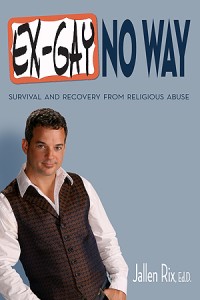
Jallen Rix, an ex-gay survivor, curated the study for Beyond Ex-Gay
By Zack Ford
Beyond Ex-Gay is a community for survivors of any form of “sexual orientation change efforts” (SOCE), more commonly known as ex-gay therapy. Recently, they conducted a survey of the survivor community to gather some information about why people tried to change their sexuality and what they experienced, and the answers are revealing. Obviously this sample is biased because it’s all people who abandoned ex-gay therapy, but nonetheless, here are the stories of over 400 people who tried to “pray away the gay” — and failed.
Where Do “Unwanted Same-Sex Attractions” Come From?
Those who justify SOCE often claim that people who have “unwanted same-sex attractions” should have the right to pursue therapy to change those attractions. The use of that language — “attractions” instead of “orientation” — disguises the concept as something seemingly less permanent that truly can be changed. All major professional psychologists and psychiatrists recommend affirming whatever a person’s orientation is, and it’s telling that SOCE advocates never address why clients’ orientation might be “unwanted.”
Here were the top ten reasons the survivors entered ex-gay therapy:
To be a better Christian.
I believed it was what God wanted me to do.
I feared I would be condemned by God.
The desire to fit in with everyone, to feel “normal.”
Cultural pressure to conform to heterosexuality.
Desire to please family and friends.
I feared I would go to hell for being gay.
Fear of losing family and friends.
Misinformation of what it meant to be gay.
Self-hatred & internalized homophobia.
In other words, the driving factor as to why individuals has “unwanted” attractions is because their church, friends, family, and community all shame them into feeling that way. It’s a profit cycle, with SOCE advocates condemning homosexuality specifically to attract clients into ex-gay therapy — whose narratives they then use to continue condemning homosexuality.
Does Ex-Gay Therapy Cause Harm?
Any doubt about whether SOCE is harmful can be clarified by its survivors, 92 percent of whom said they experienced harm. In fact, 16 percent went so far as to say it “devastated my life,” with another 31 percent saying that they were “harmed a lot.” When answering another question about why they stopped pursuing ex-gay therapy, 22 percent said it was because they “had a nervous breakdown.” Harms that were documented included shame (80 percent), emotional harm (79 percent), depression (72 percent), reinforced self-hate, (63 percent), and strikingly, 41 percent of those who said they were harmed said they felt suicidal because of the therapy.
Of those who say they experienced harm from SOCE, 84 percent say it still affects them to some extent today.
Are Young People Particularly Vulnerable To Ex-Gay Therapy?
Respondents were asked what age they began to pursue an ex-gay experience, and though the range was 43 years wide, the average age was 22.4 years old. In fact, the most common age people began some form of treatment was 18-20, with significant numbers starting as young as 15.
Last year, California passed a law banning SOCE for minors, though it is currently being challenged in court by conservative groups. New Jersey and a few other states are considering similar laws. These are important protections, because young people are particularly vulnerable to pressure from their families and communities as described above, and minors have no consent if they are forced into the treatment.
What Happens In Ex-Gay Therapy?
SOCE is often defined by what survey editor Jallen Rix describes as the “squeaky wheel,” the most crazy (i.e. marketable for television) claims that are discussed on talk shows, like exorcisms and “touch” therapy. In this survey, those extreme practices represented a minority of the experiences. Instead, respondents described more familiar forms of ministry and therapy, with 70 percent saying their experiences involved receiving prayer, one-on-one counseling, and using self-guided tools like books. This is important to note given the high rates of harm that they experienced — it does not require the more extreme treatments to cause stigma and shame.
Too often, the lived experience of ex-gay survivors is lost when discussing SOCE. This important survey, with its many written responses, creates a new visibility for just what happens in ex-gay therapy. Box Turtle Bulletin has highlighted some of the profound written responses, and they can all be perused on Beyond Ex-Gay’s site.
by Justin Green
This is neat, and certainly adds to the idea that gay marriage is a stabilizing, conservatizing force upon society:
Cummings-Thomas said many couples who travel to the D.C. area to marry are from states that ban same-sex marriage. Returning home, they find that "being able to change their name is a way to have their home state recognize their marriage," in spirit if not in fact. For their own part, the two women had shown up at the courthouse early, the first same-sex couple to get a license in Howard County, Maryland. They were planning to share a name: They just had to figure out which one. Probably Reid, they were thinking.
The decision to take the same surname is one way same-sex couples are rehabilitating—repurposing, you might say—some of the most ancient marital traditions. Name-change dates back to the common-law doctrine of "coverture," when a bride assumed her husband's name and legal identity and, in what is called "civil death," ceased to exist as a separate legal person. Feminism inspired some women to reject this tradition—about 10 percent of women, according to studies, decline to take their husband's surname—taking a stand for autonomy but contributing to a world in which teachers are sometimes unsure which children belong to which parents, and the generation who grew up with hyphenated names must decide whether to exponentially burden their own offspring. In embracing the standard option, same-sex couples are lending it a new, radicalized flavor. Not only lesbian brides but some gay grooms change their names; whether this will pave the way for straight men remains to be seen. Name-changing may turn out to be something men do when partnering with men, but not when partnering with women. The number of straight men who change their name upon marriage, remains so tiny as to be imperceptible.
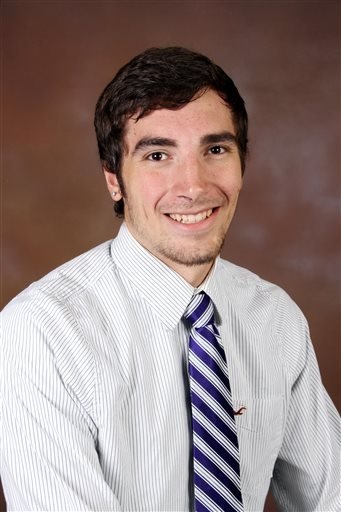
By ERIC OLSON
It didn't take Jason Collins for Jallen Messersmith to come out as gay.
Messersmith is a 6-foot-7 shot-blocking specialist from tiny Benedictine College in Atchison, Kan. He also is believed to be the first openly gay active player in U.S. men's college basketball.
Messersmith told The Associated Press on Wednesday that he revealed his sexual orientation to his coach last summer and his teammates before the season. He later told his story to Outsports.com, a website that covers gay issues in sports, and its story was posted Tuesday - a month after Collins, a Washington Wizards reserve, came out in a Sports Illustrated article as the first openly gay active player in the NBA.
''He wasn't a buffer for me,'' Messersmith said, adding that just about everyone at 2,000-student Benedictine knew his sexual orientation months ago. He said he had not corresponded with Collins.
''It's awesome to have another person in my sport to come out (nationally) beforehand,'' Messersmith said.
Messersmith said he was interviewed by Outsports.com in March. He said he's received nothing but positive feedback since the story was posted.
Though he acknowledged he felt anxious about the reaction, he said he wanted to come out to help other gay athletes feel comfortable about who they are.
''The big thing for me, why I wanted to do it, before the whole Jason Collins thing, is there weren't a lot of basketball-related stories like this,'' Messersmith said. ''When I started coming out, I didn't have anyone to look to for advice or to see how their story went. People can look to see what happened to me - and there are positive things going on.''
Benedictine is affiliated with the Roman Catholic Church, which condemns homosexual acts but teaches that gay individuals should be treated with respect, compassion and sensitivity.
Messersmith said he's not a practicing member of any religion now. He said he was raised as a Mormon and, even though that religion also disapproves of homosexual acts, he enjoys the full support of his family.
Benedictine athletic director Charlie Gartenmayer and men's basketball coach Ryan Moody declined comment, referring to a statement the school released Wednesday.
''We support Jallen as a Benedictine College student and as a member of the Raven basketball team,'' the statement said. ''Obviously, it would be inappropriate for us to discuss the private lives of students. As an institution we treat all students with respect and sensitivity.''
Brett Fisher, a starting guard and one of Messersmith's best friends on the team, said Messersmith came out to teammates individually. Fisher said some were shocked and others didn't blink.
''I think it takes a lot of courage to come out to everyone you know,'' Fisher said. ''He sort of feels like he had a thousand pounds lifted from his shoulders when he came out.''
Messersmith said he couldn't have hoped for a better reaction from teammates.
''A couple came up and told me if I have any issues with anybody, they've got my back,'' he said.
The 20-year-old from Blue Springs, Mo., will be a junior for the Ravens next season. He appeared in 28 games this past season, starting the last eight, and averaged 4.9 points and 3.6 rebounds. He blocked 53 shots, and his average of 1.89 a game ranked third in NAIA Division I.
Messersmith said he comes from a basketball family. He also plays piano and likes to draw in addition to playing video games and listening to music. He's an accounting major who is involved in student government and serves as manager for the Benedictine women's lacrosse club team.
Messersmith said he's received more than 100 texts, emails and messages through social networks since Tuesday, one from as far away as South Africa. He said he couldn't imagine what the public's reaction would be if he played in a major-college basketball program.
''For sure it would be a bigger story, and this seems pretty big,'' he said.
Kerri Kos, a fellow Benedictine student and Messersmith's best friend, said she was scared for him when he told her he wanted to come out to the basketball team.
''He doesn't want his teammates to live in the dark about it,'' she said. ''The basketball team is incredibly close. To be part of the team, he needed to be completely honest about it. He took a huge leap of faith, and people responded positively. I'm so happy about it because it shows progress.''